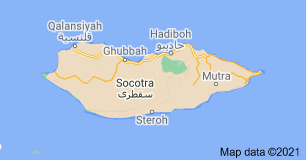UAE-Israeli annexation of Yemen’s strategically located Socotra Island has profound implications for the ever-changing balance of power in the Middle East and Africa.

The United Arab Emirates (UAE) threw the Palestinians to the wolves in “normalizing” ties with the apartheid state of Israel in August 2020. Now, one year later, Abu Dhabi and Tel Aviv have formalized their first joint colonial enterprise in the Middle East – on Yemen’s Socotra Island.
According to a report published in mid-September by the Iran-based Ahlul Bayt News Agency (ABNA), Israel and the UAE have reached an agreement to share control of the UNESCO listed island for the purpose of expanding their shared military intelligence operations at Socotra’s airport, the largest on the island.
Citing “informed sources,” ABNA alleged that the UAE’s Khalifa Foundation and the Red Crescent have entered into a contract with Israeli companies Yossi Abraham and Mifram to expand the Hidaybu airport, which the UAE and Israeli security forces are using to conduct naval and air intelligence operations.
This report has since been confirmed by the Yemeni Press Agency (YPA).
UAE-backed militias, known collectively as the Southern Transitional Council (STC), seized Socotra last June from forces aligned with Yemen’s internationally recognized government, the same ruling body the Saudi-UAE coalition supposedly invaded Yemen to protect from Houthi forces. The contradictory nature of the UAE’s actions has prompted observers to describe Abu Dhabi’s annexation of the island as a “civil war within a civil war.”
The UAE’s criminality in supporting the STC and the potential harm from its partnership with the Israeli military cannot be overstated.
The UAE’s criminality in supporting the STC and the potential harm from its partnership with the Israeli military cannot be overstated. Socotra is strategically located at the mouth of the Gulf of Aden, overlooking the Bab el-Manded Strait, which connects the Red Sea to both the Gulf of Aden and Arabian Sea. Thus, having a hold over it would complement the UAE’s control of seaports in Somalia, Djibouti, Eritrea, and Sudan.
In the race for dominion of the Red Sea, the UAE is the clear front runner, and it’s piggybacking its newest ally – the Israeli state – along for the ride.
As noted by the Daily Sabah, the UAE’s annexation of Socotra adds to the 78 operational marine and island terminals it already owns in 40 countries, across six continents, which potentially could “make the UAE one of the most powerful nations on the planet.”
Hiding behind the locally-based and privately-owned Dubai Ports World (DP World), the UAE government is “spearheading the aspirations of both the Emirati private and public sectors in the Red Sea and the Horn,” observes Rohan Advani for The Century Foundation.
“Private Emirati infrastructure projects in the Horn of Africa are not neutral economic projects. Rather, these ports, highways, security installations, and water and sanitation facilities are intimately linked to Emirati foreign policy,” says Advani. “They are important mechanisms for the expansion of both Emirati capital and power. This expansion is, in essence, imperial—it is a marriage of international economic and political
The Israeli-UAE security partnership also gives Israel unprecedented control and capabilities beyond its borders in the Middle East and the Horn of Africa. This is likely why former Israeli Prime Minister Benjamin Netanyahu welcomed UAE Ambassador Mohamed al-Khaja earlier this year with the words, “We’re changing the Middle East. We’re changing the world.”
The joint base at Socotra grants both countries unprecedented power over their mutual arch nemeses and adversaries—Iran and Turkey.
Furthermore, the joint military and intelligence base at Socotra grants both countries unprecedented power over their mutual arch nemeses and adversaries—Iran and Turkey respectively.
“For Iran, there is a growing feeling of ‘strategic encirclement’ and loss of strategic depth because of the deals between the UAE, Bahrain, and Israel,” writes Mohammad Soliman for the Middle East Institute. “For a long time, Tehran had worked actively to strategically encircle Israel in Gaza, Lebanon and Syria,” but the Abraham Accords have put Israel in the Gulf “within miles of Iran,” and to the detriment of Turkey’s ambitions in Libya, Sudan, and Yemen.
Is it any wonder Emirati Crown Prince Mohammed bin Zayed (MBZ) views Israel to be his country’s most significant strategic partner?
He not only gets to align with the region’s most formidable military power and establish closer ties to Washington, but also channel his hatred and fear of Iran and political Islamist groups – particularly the Muslim Brotherhood – with the kindred Zionist regime.
It has allowed the defacto Emirati ruler to put diplomatic and military distance between the UAE and its geopolitical cousin Saudi Arabia as well, with Israel providing Abu Dhabi a much broader security umbrella than Riyadh could ever hope to offer.
For MBZ, the Abraham Accords have been the gift that keeps on giving.
For MBZ, the Abraham Accords have been the gift that keeps on giving, and with the exclusion of the US F-35 fighter jet program, the annexation of Socotra is the greatest reward of all. Indeed, it not only affords the UAE “full control of the archipelago’s air and sea domains,” as stated by Mukhtar al-Rahbi – the advisor to the Minister of Information in Yemen’s internationally recognized government – but also unimpeded access to the island’s array of natural resources, such as rare plants, minerals, and precious stones.
As such, the UAE-Israeli annexation of Socotra is arguably the most noteworthy yet underreported strategic military victory in the region since Israel’s crushing defeat of the allied Arab armies in 1967. And if the devastating outcomes of UAE meddling in Yemen so far are any indication of what’s to come, the developments around this joint occupation should be monitored closely.

